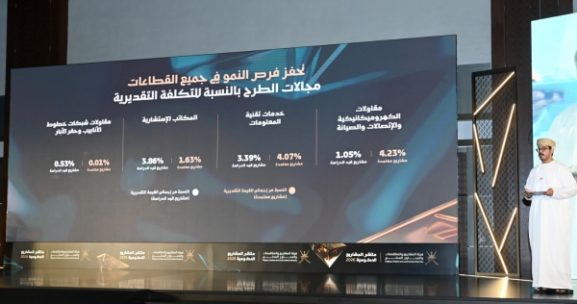حملة عُمان للهيدروجين الأخضر: ما يعنيه ذلك للمستثمرين والشركات في السلطنة
مسقط، 24 أغسطس/آب - مع استعداد سلطنة عُمان لاستضافة قمة الهيدروجين الأخضر في وقت لاحق من هذا العام، يتركز الاهتمام على عوامل حاسمة مثل الاستثمار الأجنبي المباشر، وقابلية تمويل المشاريع، والشراكات الدولية الاستراتيجية الضرورية لترسيخ مكانة السلطنة كقائد عالمي في مجال التحول في مجال الطاقة.
أكد الدكتور فراس العبدواني، المدير العام للطاقة المتجددة والهيدروجين بوزارة الطاقة والمعادن، على أن ثقة المستثمرين عنصرٌ أساسي في استراتيجية عُمان للهيدروجين الأخضر. وفي مقابلة مع برنامج "محادثات الطاقة"، أكد أن الجدوى المالية للمشاريع ستحدد في نهاية المطاف وتيرة التطوير ونطاقه. وأضاف: "لهذا السبب، نولي الأولوية للأسس الأساسية - قابلية التمويل، ولوائح واضحة للمستثمرين الأجانب، وضرائب منضبطة، وشفافية في تخصيص الأراضي. هذه الضمانات هي ما يسعى إليه الممولون الدوليون، وعُمان ملتزمة بتوفيرها".
أشار الدكتور العبدواني إلى أن سمعة عُمان الراسخة كمركز طاقة موثوق يمنحها ميزةً واضحةً في الحصول على الدعم المالي. وبعد نجاحها في استضافة مشاريع نفط وغاز واسعة النطاق، تتمتع عُمان بخبرةٍ واسعةٍ في جذب تمويلٍ كبيرٍ من البنوك العالمية ووكالات ائتمان الصادرات والمستثمرين المؤسسيين. وما يميز المبادرات الحالية هو تركيزها على مشاريع الطاقة المتجددة منخفضة الكربون، والتي تجذب الممولين الملتزمين بالاستثمارات الخضراء والمرتبطة بالمسؤولية الاجتماعية والبيئية والحوكمة.
ومن الجدير بالذكر أن العديد من المطورين قد استعانوا بالفعل بجهات تمويل خاصة بهم، مستفيدين من دعم حكوماتهم المحلية أو مؤسسات تمويل المناخ. وعلى الصعيد المحلي، تعمل وزارة المالية العُمانية على تعزيز مبادرات السندات الخضراء ضمن إطار برنامج "استدامة"، مما يؤكد التزام الدولة بمسارات تمويلية متسقة.
أوضح الدكتور العبدواني قائلاً: "تُوفر قمة الهيدروجين الأخضر منصةً مثالية. فهي تجمع الممولين والمطورين وصانعي السياسات والبنوك المحلية لتعزيز الثقة في أن المشاريع مُهيأة للنجاح، حتى عندما تصبح إعادة التفاوض ضروريةً بسبب تحولات السوق".
تتجاوز نقاط قوة عُمان حدود التمويل: فمواردها المتجددة عالمية المستوى، وبيئتها السياسية والتنظيمية المستقرة، وتصنيفاتها الائتمانية السيادية المُحسّنة، وموقعها الاستراتيجي الذي يربط شرق آسيا بأوروبا، كلها عوامل تُعزز جاذبيتها. وأكد قائلاً: "لطالما أوفت عُمان بالتزاماتها". وأضاف: "تُمثل هذه الموثوقية ميزة تنافسية للمستثمرين".
يُعدّ التعاون الدولي الاستراتيجي بالغ الأهمية لطموحات عُمان في مجال الهيدروجين الأخضر. وبناءً على إرثها العريق في تجارة الغاز الطبيعي المسال والهيدروكربونات، تُرسي عُمان مساراتٍ وشراكاتٍ جديدة للهيدروجين، بما في ذلك مسارٌ مُخططٌ له للهيدروجين السائل إلى أمستردام، واتفاقيةٌ عبر ميناء روتردام للوصول إلى الأسواق الألمانية، وتحالفاتٌ موسعةٌ مع المملكة المتحدة والولايات المتحدة وكوريا الجنوبية واليابان، وبصورةٍ متزايدةٍ مع الصين.
قال الدكتور العبدواني: "الأمر يتعلق في الواقع بالتوفيق بين المصدرين والمستوردين. وتتجاوز هذه الشراكات الجزيئات لتشمل نقل التكنولوجيا، وأمن الطاقة، وتحقيق أهداف مشتركة في مجال إزالة الكربون".
واستشهد ببلجيكا كمثال رئيسي. فإلى جانب فتحها أبواب الأسواق الأوروبية، أصبحت مجموعة فلوكسيس البلجيكية للبنية التحتية للطاقة مستثمرًا استراتيجيًا مباشرًا في شركة نقل الغاز العمانية OQGN، مدفوعةً جزئيًا بفرص الهيدروجين الأخضر. في الوقت نفسه، لا تزال كوريا واليابان شريكتين راسختين على المدى الطويل في آسيا، حيث يُبشر تنامي مشاركة الصين بتوسيع نطاق التعاون. وأشار إلى أن "جميع هذه الدول ترى منافع متبادلة. يكمن التحدي في تحديد آليات التعامل مع أحجام السوق، ونواقل الهيدروجين، وأطر الدعم. هذه قضايا معقدة ومتطورة".
تُبرهن المبادرات العالمية، مثل مبادرة H2Global الألمانية، التي تُسهّل إبرام اتفاقيات محايدة بين المشترين والموردين، على إمكانات التعاون الدولي المنظم. وصرح قائلًا: "سواءً من خلال مبادرة H2Global أو غيرها من الآليات، فإن هذه المنتديات لا غنى عنها".
أكد الدكتور العبدواني أنه من المتوقع أن تحقق دول قليلة الاكتفاء الذاتي من الهيدروجين الأخضر، مؤكدًا سعي عُمان لأن تكون شريكًا موثوقًا به. وأضاف: "نطمح إلى بناء منظومة جاذبة للمستثمرين، وجاذبة للممولين، ومفيدة للشركاء الدوليين. والقمة هي المكان الذي تجتمع فيه هذه العناصر".
—
يحافظ هذا التقرير المعاد كتابته على جميع التفاصيل الواقعية مع تعزيز الوضوح والاحترافية، مع استخدام الكتابة الغامقة فقط في الافتتاحية للتأكيد على التركيز الحاسم لاستراتيجية عُمان.
تحليل خاص من عمانت | تصفح سوق عُمان
سلطنة عمان تسعى جاهدة لتعزيز ثقة المستثمرين من خلال اللوائح الواضحة والضرائب المتوقعة وتخصيص الأراضي بشكل شفاف يخلق بيئةً جاذبةً لاستثمارات الهيدروجين الأخضر. بالنسبة للشركات والمستثمرين، يُشير هذا إلى قوة فرصة للمشاركة في مشاريع الطاقة الرائدة منخفضة الكربون المدعومة بشراكات دولية وأطر مالية قوية. ينبغي على رواد الأعمال الأذكياء إعطاء الأولوية للتعاون الاستراتيجي والتوافق مع النظام البيئي المتطور في عُمان للاستفادة من مكانة كمركز موثوق به وقابل للتمويل في التحول العالمي في مجال الطاقة.



